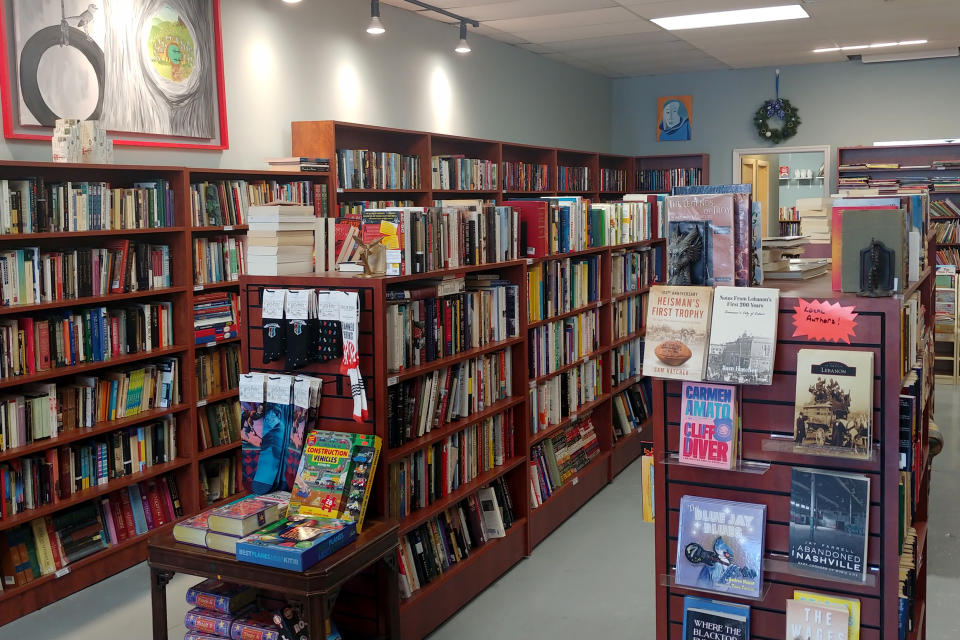Small businesses regain some lost ground as shoppers yearn for 'somewhere a little bit different'
This time last year, Cyndi Ziegler and her husband, Larry, co-owners of the High Country Candles store in Blowing Rock, North Carolina, were “doing almost everything” themselves to keep its shelves stocked.
The couple could only afford to hire two other part-time staff members due to limited finances at the time.
However, on Black Friday this year, the homemade-candle business had its bestselling day in its nearly 30-year history. Heading into the holiday season, the store now has six staff members, sales are up by as much as 16 percent, compared to a year ago, and foot traffic is back.
“I think with the pandemic, people wanted to get maybe out of big cities and go somewhere a little bit different and do Christmas shopping,” Cyndi Ziegler told NBC News. “I’ve met people from all over.”

The small businesses that are still standing alongside the Zieglers this holiday season have seen renewed strength since last year, when there were greater Covid-19 restrictions and the vaccine was not yet widely available.
On Small Business Saturday last weekend, total projected spending, which was self-reported, at independent retailers and restaurants soared above pre-pandemic levels to $23.3 billion, according to the American Express 2021 Small Business Saturday Consumer Insights Survey, while the National Retail Federation found that 51 million consumers shopped in-store on that day. Around 85 percent of businesses that temporarily closed during the pandemic have reopened as of Sept. 30, according to a recent report from the business review company Yelp.
Although the lights shine a little bit brighter for small businesses this holiday season, many stores continue to face challenges connected to supply chain jams, hiring problems and high consumer demand in the weeks leading up to a time when many reap a large portion of their annual revenue. Almost one-third of small businesses experienced difficulties hiring late last month, according to the latest Small Business Pulse Survey from the U.S. Census Bureau.
For Kidding Around, a toy store in New York City, holiday sales account for about 70 percent of its annual revenue, president and founder Christina Clark said. At this time of year, that means more hands on deck — something the store does not currently have. Clark said the store is short six staff members, forcing her to call in her two siblings who live on the West Coast for backup.
“It’s been horrific,” she said. “I have the newest staff I’ve ever had, I have the most inexperienced staff I’ve ever had, and my daughter and I are running ourselves ragged. I haven’t had a day off in more than two weeks.”

Even after starting holiday preparations in June, inventory is still not where it should be, either. Clark said order delays have ranged from six weeks to six months to never arriving at all.
“Usually, this time of year, I have as much stock as I can possibly manage. You can’t walk into my storerooms, it’s so full,” she said.
Today, it’s different.
“It looks like I’m on the way to being depleted. There will be many, many things that I will be out of,” she said, adding that she has not been able to get popular items such as Pokémon cards or LOL Surprise dolls to put on shelves this season. Dollhouses and doll furniture have also been difficult to source, she said.
Harper’s Books in Lebanon, Tennessee, which owner James Kamer said earns up to 20 percent of its annual revenue during the time between Black Friday and Christmas, has also been hit by supply chain woes. He said the number of back orders at his independent bookshop has tripled in 2021 versus 2020, with newer titles and older ones, which are highly sought after, being difficult to come by recently.
“This past month has been really difficult. Shipping is really starting to slow down,” he said. “A lot of the titles that we order are not in stock. We can’t get them. Publishers are saying that they’re not going to be printed until after the first of the year.”
In response, he has stocked empty shelves with jigsaw puzzles and graphic novels and even added a section dedicated to books written by local self-published authors to keep the store’s overall inventory level up to speed.
While Ziegler said her candle shop inventory is “great,” that's because she and her husband made multiple trips to her supplier in Pennsylvania to get materials and stock. Since the pandemic began, she said her jar, wax and oil order shipping times have increased from less than a week to up to two months.
“Sometimes we’re waiting six to eight weeks for something to get to us. That’s only a 10-hour drive away, so we said 'Well, let’s just go get it ourselves,'” she said. She and Larry have made this trip an estimated 10 times since the onset of the pandemic.
Most small businesses cannot afford to eat extra costs this holiday season, said Hitendra Chaturvedi, professor of practice in the supply chain management department at Arizona State University’s W. P. Carey School of Business.
With supply chain issues that could make or break businesses competing for inventory with larger retailers, “it is actually hurting them to be running a small business right now,” he said.
